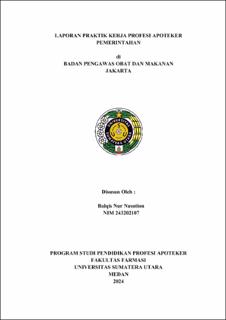| dc.contributor.advisor | Husori, Dadang Irfan | |
| dc.contributor.advisor | Islami, Rosa Pangestika | |
| dc.contributor.author | Nasution, Balqis Nur | |
| dc.date.accessioned | 2025-09-29T06:51:58Z | |
| dc.date.available | 2025-09-29T06:51:58Z | |
| dc.date.issued | 2024 | |
| dc.identifier.uri | https://repositori.usu.ac.id/handle/123456789/108760 | |
| dc.description.abstract | Background: Rapid technological advancements and the globalization of international trade have driven swift changes in the drug, food, cosmetics, and medical device industries, allowing for massive and rapid product distribution across all societal strata. This increase in consumption, fueled by lifestyle changes and aggressive promotion, is often not balanced by adequate public knowledge for selecting safe and rational products. This condition elevates the risk of large-scale health hazards from substandard or contaminated products. Therefore, Indonesia established the National Agency of Drug and Food Control (BPOM) as an effective Drug and Food Control System (SisPOM) to protect consumer safety and health.
Objectives: The main objectives of conducting the Pharmacist Professional Practice (PKPA) at BPOM are: To know and understand the main duties and functions of BPOM comprehensively, To know and understand the specific role of pharmacists in drug and food supervision, especially within the National Center for Drug and Food Testing Development (PPPOMN), To comprehend the main tasks, functions, and operational activities of PPPOMN at BPOM.
Summary: This PKPA focuses on gaining an in-depth understanding of the quality and safety control system for health products amidst the challenges of globalization and changing lifestyles. The placement at BPOM, with a focus on PPPOMN, provides direct insight into the testing mechanisms and the development of the latest control methods that serve as BPOM's frontline in maintaining product quality and responding to food and drug safety risks.
Conclusion: This PKPA concludes that mastering BPOM's functions and the strategic role of pharmacists, particularly in PPPOMN, is essential. Pharmacists who understand the SisPOM will be able to contribute professionally to the efforts of detection, prevention, and product monitoring to enforce protection and ensure the safety and health of consumers, both in domestic and international markets. | en_US |
| dc.language.iso | id | en_US |
| dc.publisher | Universitas Sumatera Utara | en_US |
| dc.subject | The National Agency of Drug and Food Control | en_US |
| dc.subject | The Drug and Food Control System | en_US |
| dc.subject | Pharmacist Professional Practice | en_US |
| dc.subject | Pharmacist | en_US |
| dc.subject | The National Center for Drug and Food Testing Development | en_US |
| dc.title | Laporan Praktik Kerja Profesi Apoteker Pemerintahan di Badan Pengawas Obat dan Makanan Jakarta | en_US |
| dc.title.alternative | Pharmacist Professional Practice Report at the National Agency of Drug and Food Control (BPOM), Jakarta | en_US |
| dc.type | Thesis | en_US |
| dc.identifier.nim | NIM243202107 | |
| dc.identifier.nidn | NIDN0011048207 | |
| dc.identifier.kodeprodi | KODEPRODI48901#Pendidikan Profesi Apoteker | |
| dc.description.pages | 81 Pages | en_US |
| dc.description.type | Karya Tulis Profesi | en_US |
| dc.subject.sdgs | SDGs 4. Quality Education | en_US |


